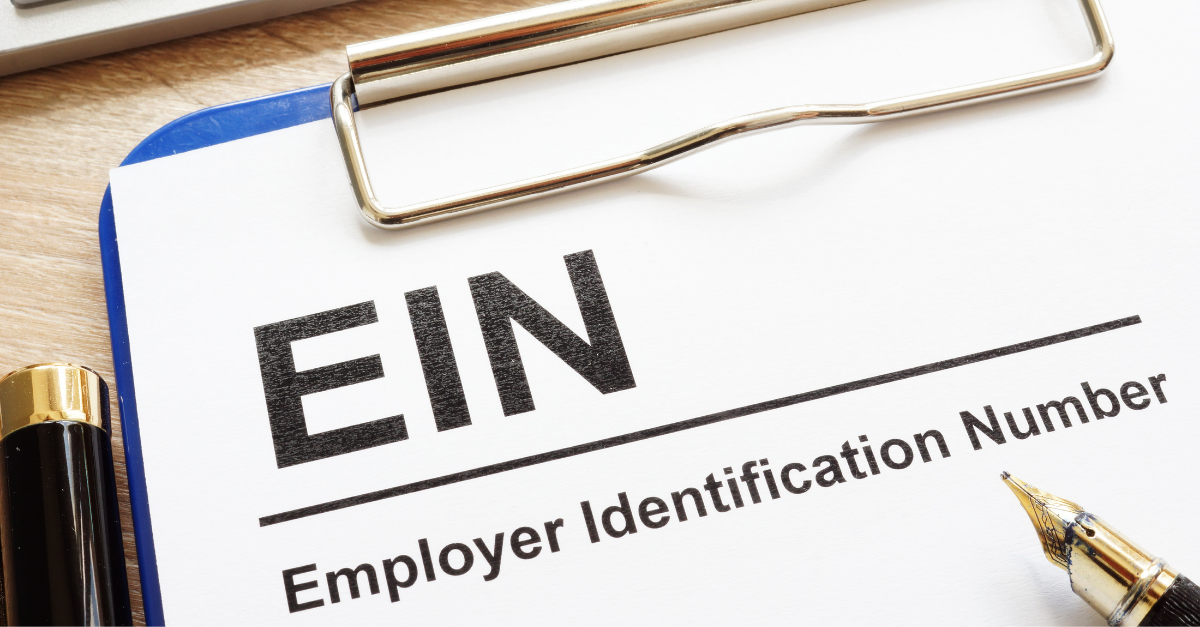TINs (Taxpayer Identification Numbers) play a fundamental role in all financial and tax-related matters in the United States. Whether it's your Social Security Number (SSN) or an Employer Identification Number (EIN) for a business, TINs are used for tax reporting, identity verification, financial transactions, and determining eligibility for various benefits and credits. Understanding TINs is important for individuals and businesses that want to navigate the tax system, maintain compliance, protect against identity theft, and access the financial resources they need.
For business owners, TINs are essential for accessing all types of financial services, like merchant accounts. Without the correct TINs, your business won't be able to accept payments, open a business bank account, or access loans. This guide explores TIN numbers, different types of TINs, how to get one, and other related topics. Continue reading to uncover the importance of TIN numbers and how they can impact both your business and personal life.
What is a TIN Number?
TIN stands for Taxpayer Identification Number. It is a unique numerical identifier used for tax purposes. The term encompasses various types of numbers, including SSNs for individuals and EINs for businesses. With the exception of SSNs, (which the Social Security Administration issues), the IRS issues all tax identification numbers. Businesses and individuals rely on TINs to establish communication with the IRS and execute several financial and tax-related functions.
When Would I Need a Tax ID Number?
Various situations require a tax ID number; some are personal, and others are business-related. Let's explore some common examples of when you may need one:
For Personal Reasons
Below are instances in which an individual may require a tax ID number:
- Applying for financing
- Applying for school
- Obtaining government benefits
- Applying for jobs
- Obtaining a passport
- Proving your identity (this is why it's critical to never share SSNs or other tax ID numbers with others)
- Filing a tax return
For Business Reasons
Below are instances in which a business may require a tax ID number:
- Employing staff members
- Filing business tax returns
- Applying for a merchant account
- Applying for business loans
- Applying for vendor credit
- Legal compliance
- Opening business bank accounts
Types of Tax Identification Numbers
There are various types of tax identification numbers — all of which are essential for business owners to understand. Let's explore the five primary types in the United States:
Preparer Tax Identification Numbers (PTIN)
A PTIN, or Preparer Tax Identification Number, is a nine-digit identifier issued by the IRS to tax professionals who prepare and file federal tax returns for clients. Since January 1, 2011, PTINs have been a requirement for anyone receiving payment for preparing tax returns. It helps the IRS track tax return preparation and maintain a record of tax preparers' activities, ensuring compliance with tax laws and regulations. Tax professionals must renew their PTIN annually—in 2023 alone, the IRS issued 774,735 PTINs to individuals throughout the United States.
Individual Taxpayer Identification (ITIN)
An Individual Taxpayer Identification Number (ITIN) is a nine-digit identifier issued by the IRS to individuals who are required to pay taxes in the United States but are not eligible for a Social Security Number (SSN). So, who is eligible for an ITIN?
- Nonresident and resident aliens
- The spouse of a nonresident or resident aliens
- The dependents of nonresident and resident aliens (only if not eligible for SSNs)
Social Security Number (SSN)
An SSN (Social Security Number) is a personal barcode for living in the United States, uniquely identifying individuals and connecting them to various aspects of financial and legal existence. It is akin to a digital fingerprint for government purposes. This is the most common type of tax ID number in the United States: More than 450 million SSNs have been issued to date. Social Security Administration FAQs. Individuals require an SSN to file taxes, open bank accounts, apply for jobs, and more. Likewise, parents must apply for their child's SSN to claim the child as a dependent on their tax returns.
Adoption Tax Identification Number (ATIN)
An Adoption Tax Identification Number (ATIN) is a temporary tax identification number issued by the IRS (Internal Revenue Service) for adoptive parents who are in the process of adopting a child but haven't yet received their finalized adoption papers with the child's Social Security Number (SSN).
The ATIN allows adoptive parents to claim their child as a dependent on their federal income tax return, making them eligible for adoption-related tax credits and deductions while waiting for the child's SSN. Once the adoption is complete and the child has an SSN, the ATIN is no longer necessary.
Employer Identification Number (EIN)
An EIN is a unique nine-digit identifier assigned by the IRS to businesses and organizations in the United States. This number is essential for activities such as hiring employees, opening business bank accounts, and filing tax returns. It helps the IRS track and identify business entities, ensuring proper taxation and compliance with federal regulations.
Other businesses may also use your EIN to identify your business for vendor credit. It's critical to obtain an EIN if you have plans to scale your business beyond the level of a small sole proprietorship.
How to Get a Tax ID Number
Let's explore how to obtain the previously-mentioned tax ID numbers:
Preparer Tax Identification Number
To obtain a PTIN, head to the IRS Tax Professional PTIN System and create an account. The application process should take around 15 minutes. There's also a $30.75 non-refundable fee.
Individual Taxpayer Identification Number
To obtain an ITIN, submit Form W-7, proof of identity, a tax return, and foreign status documentation to the IRS. Mail it to the address on the W-7 form or submit your documents in person by heading to a local IRS office.
Adoption Tax Identification Number
To obtain an ATIN, parents must submit Form W-7A, a copy of the child's placement documentation, and other required information to the IRS. Mail it to the address on the W-7A form or drop it off at a local IRS office.
Employer Identification Number
The easiest way to apply for an EIN is via the IRS's online application portal (although fax and mail applications are also options). Head to the IRS EIN application website, read the information to ensure you're eligible for an EIN, and click the "Apply Online Now" button to proceed with the application.
Social Security Number
To obtain an SSN, head to the Social Security Administration's online application page. Make sure to have all your personal details available before you begin the application process.
How to Find Your TIN Online
To find your TIN online, follow these steps:
- Go to the IRS Website: Visit the official website of the IRS and head to the Taxpayer Identification Numbers (TIN) page.
- Select the Appropriate TIN: Choose the TIN that corresponds to your situation. The most common TIN is the Social Security Number or Employer Identification Number.
- Follow the Instructions: The page will provide step-by-step instructions for applying for or recovering your TIN. You may need to provide personal information, answer security questions, or complete a form online.
- Verification: The IRS may use information from your most recent tax return for verification purposes. Make sure your information matches what's on your tax return.
You can also find your TIN on previous tax returns, TIN application documents, or from your bank. Remember that TINs are sensitive personal information; always ensure you are using the official IRS website or a trusted government portal when retrieving or verifying your TIN online. Don't make the mistake of putting sensitive personal or business details into a scammer's website.
Closing Thoughts on TIN Numbers
TINs are the linchpin of United States financial and tax operations, serving as unique identifiers for individuals and businesses. They're indispensable for accurate tax reporting, legal compliance, financial transactions, and accessing benefits. Underestimating their importance can lead to financial and legal complications, including penalties, identity theft, and missed opportunities.
This guide outlines all the information you'll need to obtain the correct TINs—and for businesses just starting out, applying for the right one is essential. Merchant service providers and other financial services companies require TINs to set up new accounts, so be sure to get one before applying for a merchant account. Without the correct tax identification numbers, you won't be able to accept payments, open business bank accounts, or build business credit.
Frequently Asked Questions (FAQs)
A TIN (Taxpayer Identification Number) is a broader category that includes an EIN (Employer Identification Number). While both are for tax purposes, an EIN is a specific type of TIN used exclusively by businesses and other entities to report income, hire employees, and conduct financial transactions. Conversely, a TIN refers to various tax ID numbers, including Social Security Numbers (SSNs) for individuals and ITINs for non-resident aliens, each serving distinct tax-related functions.
No, a Taxpayer Identification Number (TIN) is a broad term for various tax ID numbers. Both TINs and SSNs are distinct identification numbers. An SSN is primarily used for individuals, issued by the Social Security Administration, and is used for personal identification, employment, and government benefits. A TIN, on the other hand, is used for various entities, including businesses and non-individual entities, to report income and pay taxes. It encompasses several types, such as an EIN for businesses and an ITIN for individuals who can't obtain an SSN.
The timeframe for receiving a personal tax ID number depends on the type of TIN. For Social Security Numbers (SSNs), the SSA claims it usually takes around 7-10 to receive your SSN card, although it can be slower if you apply by mail. For an Individual Tax Payer Identification (ITIN), the IRS claims it takes around seven weeks to receive your ITIN.
Aside from Preparer Tax Identification Numbers (PTINs), tax ID numbers are free. PTINs have a $30.75 application and renewal fee.
While you may be able to apply for multiple EINs per day, the IRS will only issue one EIN "per responsible party per day." This limit remains constant across all application channels, including online, mail, fax, and telephone. There's no need to apply for multiple EINs on a single day, as it will not speed up the process of receiving any tax ID numbers!






